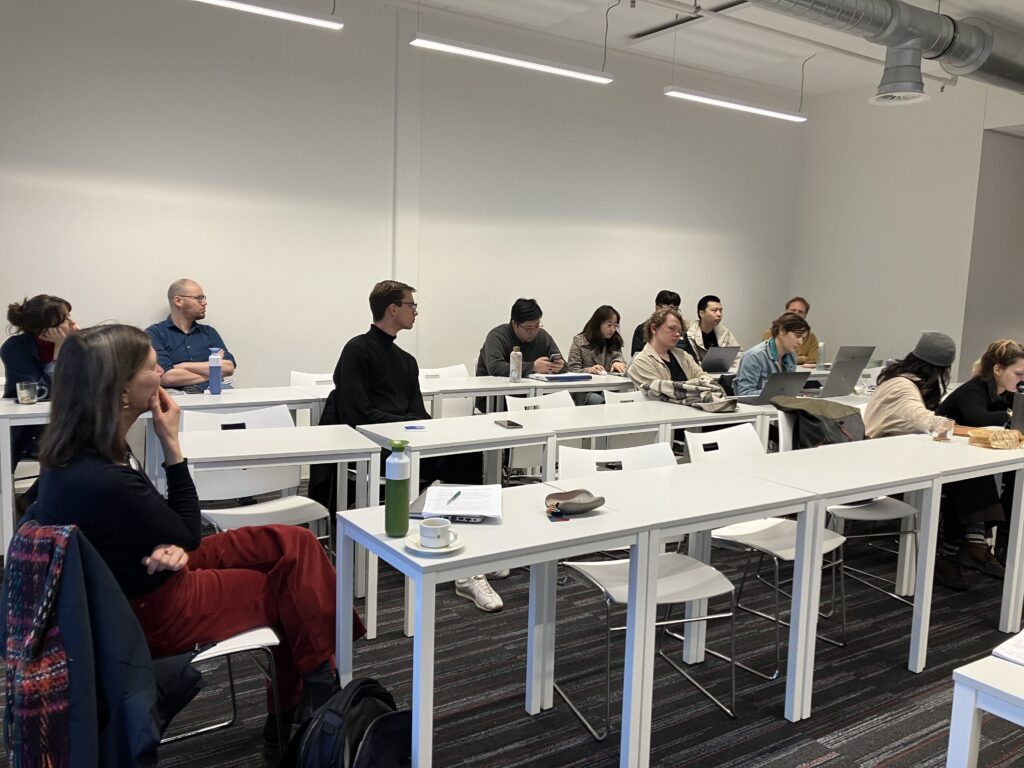By Yiran Yang
On February 27, Dr. Paul Trauttmansdorff from the Technical University of Munich visited Radboud University to present his book, The Digital Transformation of the Border Regime: The Powers and Perils of Imagining Future Borders. Organized by RUNOMI, the seminar brought together a diverse audience, including scholars, students, and researchers interested in migration, digital governance, and border studies. Dr. Evelien Brouwer (Utrecht University) and Dr. Yiran Yang (Radboud University) served as panel discussants, adding critical insights to the discussion.
Dr. Trauttmansdorff’s presentation focused on three main themes: empirical vignettes from his research on the European digital border regime, the role of the eu-LISA agency, and the imaginaries of future digital borders.
At the center of his analysis is eu-LISA, the EU’s agency responsible for managing large-scale IT systems that support border management and security, including SIS II, VIS, Eurodac, EES, ETIAS, and ECRIS-TCN. Trauttmansdorff described eu-LISA as the “Schengen information engine,” a centralized body that ensures uninterrupted data exchange between national authorities. More than a technical institution, eu-LISA is deeply involved in the social and material aspects of European digital bordering – shaping how borders are imagined, enacted, and governed.
One of the seminar’s most thought-provoking discussions revolved around the imaginaries of digital border regimes. Trauttmansdorff highlighted how the EU’s border infrastructure is portrayed through organic metaphors – depicting Europe as a constantly evolving body sustained by data flows. Yet, he also pointed to the risks of these imaginaries, for example, they homogenize diverse populations and present technological change as an inevitable, irreversible process. He critiqued how eu-LISA’s work contributes to the “laboratorization” of borders – where frictions, contestations, and vulnerabilities in human mobility are overlooked. Failures in digital border technologies, he argued, are often decoupled from responsibility and accountability, raising concerns about transparency and oversight.
Following the presentation, Dr. Evelien Brouwer initiated the panel discussion by emphasizing the book’s contribution to fieldwork on digital bordering. She pointed out that while border infrastructures often promote the seamless flow of data, their representations and actual operations have often striking dehumanizing effects. Accordingly, new digital border infrastructures often carry significant risks to human rights, as also documented by the interdisciplinary literature on EU borders and migration control.Dr. Yiran Yang built on this discussion by examining the intersection of AI and data infrastructure. She raised concerns about risk assessment systems powered by AI, which may introduce new vulnerabilities and biases in migration governance.

With 20 attendees, the seminar fostered an engaging discussion on a topic that remains underexplored in public debate. Digital border regimes are shaping the future of migration and mobility, yet they often operate outside the scrutiny of broader society. Events like this seminar play a crucial role in bringing these issues to the forefront.
Moreover, the in-person dialogue between scholars from the Technical University of Munich, Utrecht University, and Radboud University demonstrated the value of interdisciplinary collaboration. Understanding digital border regimes requires expertise from multiple fields – migration studies, law, and political science studies – to strive for a responsible and transparent development of EU border governance.
This seminar is a step in the right direction, but it is only the beginning. Moving forward, there is a pressing need for more ethnographic studies and legal analyses to critically assess and safeguard the human rights implications of digital borders. The conversation must continue.

